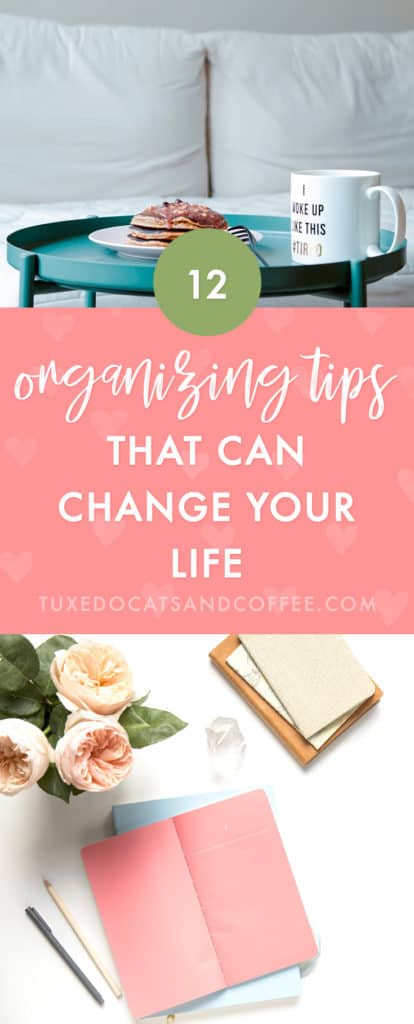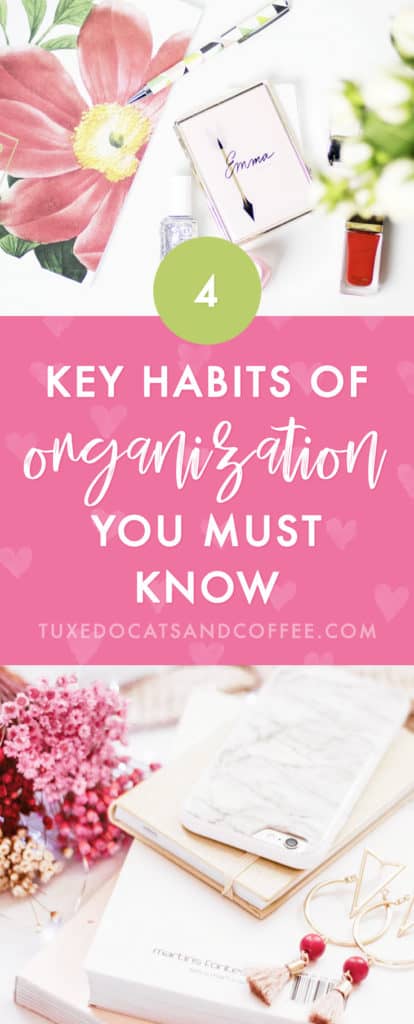12 Organizing Tips You Should Know
Affiliate Disclaimer: This page may contain affiliate links, which means we earn a commission when you buy through our link (at no additional cost to you). As an Amazon Associate, I earn from qualifying purchases. Read our full Disclosure Policy.
Is your life in disarray? Do you have trouble finding things? Do you constantly forget stuff? If so, don’t worry — you’re like most of the human population. Here are my top 12 organizing tips, or 12 organizing tips you’ll wish you knew earlier.
This post was originally written by Leo Babauta for Zen Habits. Republished here with permission.

12 Organizing Tips You Should Know
Disorganization is a natural state of order. It takes a little obsessiveness to get the chaos of the universe into some form of organization.
If you have a desire to get organized, here are my favorite organization tips … stuff I’ve learned along the way, from other sources and from experimentation.
1. Everything in its place. If you just followed one tip on this list, this would be it. Practice this, and you can skip the rest of the tips and articles listed in this post. Seriously.
So how do you do it? It’s simple. For everything that you own, designate a place for it. You can even label some of those places, to make it easier to remember. Find something that doesn’t have a place? Designate a place for it. Then simply put things back where they belong when you’re done using them. It sounds simple, but it actually takes a lot of practice to get this habit down.
2. Start small. If your life and your home and your office are all incredibly disorganized, don’t try to conquer all of it at once. Choose a small chunk (maybe the top of your desk, or at least one part of it?) and organize that. Then come up with a simple system to keep it organize, and try to practice that system until it becomes habit. Now expand your “zone of organization” further, to a new area. One chunk at a time, you can get organized.
Related: 12 Products to Organize Your Entire Home
3. Create routines. One of the best ways to keep your life organized is to make routines for everything — for errands, laundry, finances, etc. And if you do this one at a time, and make it a habit, you can optimize your life this way.
4. Clean as you go. This is a great habit … instead of having big cleaning binges, clean things as you go. Done using some dishes? Wash them right away. Clean the toilet when you finish using it, so it never gets dirty.
5. All info in one place. Use a text document, Evernote, or some other type of system to keep all the information you regularly use and need in one place. You’ll never look for it again.
6. Put it away now. Done using something? Most people will put it down somewhere nearby, with the intention of putting it away later. But messy houses and offices are full of these intentions. Instead of letting things pile up, put them away immediately. Right now, no exceptions.
7. Use an inbox, and empty it. Instead of having papers all over the place, have one inbox for all incoming papers. Well, one for your office, and one for your home. Now you’ll never lose a piece of paper again. Empty it regularly (at whatever regular intervals work for you — daily, weekly, every other day, etc.).
8. Keep a simple filing system. If your filing system is too complicated, chances are you won’t use it. Either keep your files digitally by scanning paperwork and organizing them into well-named digital folders, or use a few well-organized physical folders or binders.
9. Google Calendar. It really doesn’t matter what calendar system you use, but I’ve found that Gcal works best for me. It’s so simple and fast, and as an online calendar I can access it from anywhere. You can share a Google Calendar and put everything on it: work stuff, personal stuff, birthdays, family gatherings, reminders to follow up on things, holidays, and much more. It keeps all our scheduling in one place, and we never have to worry about remembering again.
10. A simple system for pending items. One reader recently wrote to ask me how she should organize her pending items, such as plane or theater tickets. I suggested she create a “Pending” folder to hold those items, and make a note of each item on her calendar. For those that are attached to a specific date, she could note the item on that date (“Theater tickets for 8 p.m., in Pending folder”). For items that she wants to remember periodically, she could make a note on the first of each month (for example) … so on the first of next month, there is a “Pending items” notation on her calendar, with a list of items in the Pending folder she wants to reminder herself about. If she doesn’t need to remember them yet, she can move that item to the first of the next month.
11. Make your system usable. If you’re having problems with your organization system, take a careful look at what’s tripping you up. Sometimes there’s a difficulty or complication that makes the system too difficult to use. If it’s too difficult, you won’t use it. Keep it simple and usable — if possible, even fun — and you’ll be more likely to stick to the system.
12. Create a landing strip. When I get home, I empty my pockets and put everything onto a tray near my doorway. Keys, purse, my ID and cash, cell phone, anything. This way it doesn’t get tossed on our counter or table, and we never have to look for it or forget it when we leave.
This post was originally written by Leo Babauta for Zen Habits. Republished here with permission.
A trusted organization system that you actually use regularly can turn your day from one of chaos to one of focus, effectiveness and calm. Here are 4 key habits of organization.

4 Key Habits of Organization
This is something I’ve learned through repeated failures, actually: when I become loose with my organized habits, my day becomes worse. It gets stressful and crazy, and I can’t focus on anything. Everything is in my head all the time, and I’m always worried that I’m missing something, that I should be doing something else.
But when I get my system down, and the habits are on track, things are smooth, I feel good about what I’m doing, and I’m much better able to let everything else go and focus on what’s in front of me, confident that everything else is in its place.
Why Form the Habits of Organization
Several important reasons:
- Stress: An excess of stress very negatively affects your health. If you have good habits in place to deal with all the stuff in your life, you stress out about everything less. You feel less worry that things are slipping through the cracks. You feel trust that you are OK working on what’s in front of you.
- Effectiveness: If you are able to externalize all the things you’re worried about into a trusted system, you can better focus on the task in front of you. You can single-task, and be more effective at each task, because it’s getting your full focus.
- Relationships: I’ve found relationships to be about the most important thing in my life, personal but also business. And the best way to build relationships is to be trustworthy. And the best way to be trustworthy is to keep your commitments. If you’re organized, you are more likely to keep your commitments. Organization is largely about managing your commitments.
Building Organized Habits
We often forget to use our new organization ideas because we have old habits that don’t die easily.
Luckily, we can replace the old habits with better ones, with practice. It takes about a week of very conscious effort to do this, and after that it gets more and more automatic.
Here are the habits:
- Create a place for everything. Find whatever tools work for you. I use Trello for organizing my to-do lists. The habit, though, is noticing when something is sitting in your inbox or in an open browser tab or somewhere else, not in its place. And then finding a place for it — sometimes that means consciously designating a new bucket just for that type of thing.
- Don’t procrastinate — put it away immediately: The old habit is to put it off (procrastinate) to be put away later. No. That procrastination is what leads to the system falling apart. For one week, make a very conscious effort to not put this off, but instead to take a few seconds to put information, tasks, appointments and other such things right where they belong, right now. It doesn’t take long, but you have to be very conscious about it at first.
- Don’t live in your inbox: We have a tendency to keep our email inbox open, or to open it often. That means you’re constantly responding, instead of focusing. Instead, open the inbox, and one by one, put incoming items where they belong, and archive them in your inbox. You might not get to the bottom of the list, but you save yourself from having to constantly look through the same things in your inbox over and over.
- Review your tasks every morning: Make it a habit to review your task list and calendar every morning for 20 minutes (set a timer), so you know things are in their place. Know where everything is. Then get out and start doing.
With these four habits, and a trusted system, you can now relax, and focus.
